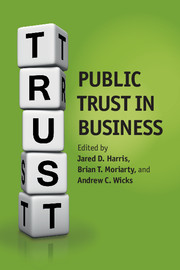Book contents
- Frontmatter
- Contents
- List of figures
- List of tables
- Notes on contributors
- Preface: discovering new territory in public trust in business
- Acknowledgments
- 1 Public trust in business: what’s the problem and why does it matter?
- Part I Trusting the institution of business
- 2 The economic crisis of 2008, trust in government, and generalized trust
- 3 Too big to trust? Managing stakeholder trust in business in the post-bail-out economy
- 4 At the crossroads of trust and distrust: skepticism and ambivalence toward business
- 5 Public trust in business and its determinants
- 6 The role of public, relational, and organizational trust in economic affairs
- Part II Public trust and business organizations
- Index
- References
2 - The economic crisis of 2008, trust in government, and generalized trust
Published online by Cambridge University Press: 05 July 2014
- Frontmatter
- Contents
- List of figures
- List of tables
- Notes on contributors
- Preface: discovering new territory in public trust in business
- Acknowledgments
- 1 Public trust in business: what’s the problem and why does it matter?
- Part I Trusting the institution of business
- 2 The economic crisis of 2008, trust in government, and generalized trust
- 3 Too big to trust? Managing stakeholder trust in business in the post-bail-out economy
- 4 At the crossroads of trust and distrust: skepticism and ambivalence toward business
- 5 Public trust in business and its determinants
- 6 The role of public, relational, and organizational trust in economic affairs
- Part II Public trust and business organizations
- Index
- References
Summary
EXECUTIVE SUMMARY
the situation
The global economic crisis of 2008 damaged trust in the institutions of business and government among the American public. The Tea Party in particular stands out as a political movement that responded by viewing both big business and big government as being at fault.
key questions
Was the economic crisis responsible for reducing trust either in government or in other people more generally? What factors shape different forms of trust? How does survey data contribute to our understanding of political movements (such as the Tea Party movement) with respect to trust in institutions?
new knowledge
When survey researchers ask whether “most people can be trusted,” respondents interpret this question as referring to strangers, not to people we know people we know. They do not tend to see the question as reflecting their life experiences, but rather as reflecting a general worldview. However, trust in people we know and people we don’t know are not the same thing, nor can we readily move from the former to the latter.
- Type
- Chapter
- Information
- Public Trust in Business , pp. 19 - 50Publisher: Cambridge University PressPrint publication year: 2014
References
- 8
- Cited by

